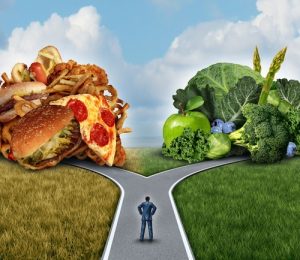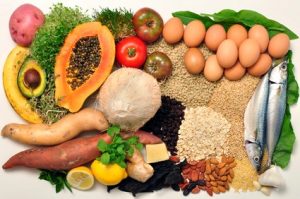Is Your Teen Crazy Because Of What They Eat?
Author: Dr. Stephen Chaney
 If you have teenagers or have had teenagers in the past, you know they can be a little crazy at times. Sometimes they are a lot crazy. It’s easy to dismiss the occasional weird behavior by attributing it to raging hormones. I wouldn’t want to dismiss the difficulty teens experience adjusting to all these new hormones running around inside their body.
If you have teenagers or have had teenagers in the past, you know they can be a little crazy at times. Sometimes they are a lot crazy. It’s easy to dismiss the occasional weird behavior by attributing it to raging hormones. I wouldn’t want to dismiss the difficulty teens experience adjusting to all these new hormones running around inside their body.
However, if you have a teenager, you also know their diet often isn’t the best. Many of them live on sodas, fast foods, snack foods and sweets. Could there be a correlation between what they eat and their mental health? In fact, several recent studies have suggested there is a correlation between poor diet and mental health issues in teens.
What is the connection between diet and mental health in teens?
This study (WH Oddy et al, Brain, Behavior, and Immunity, doi.org/10.1016/j.bbi.2018.01.002) breaks new ground.
- The scientists in charge of the study asked whether the effect of diet on mental health was direct or indirect. Specifically, they asked whether diet influenced obesity and inflammation which, in turn, influenced mental health.
- They also investigated a reverse hypothesis model. Specifically, they asked whether poor mental health led to poor diet rather than the other way around.
How Was This Study Done?
 This study has a very interesting history. It grew out of a major pregnancy study (The Raine study) initiated in Western Australia in 1989. The Raine study was designed to determine how events during pregnancy and childhood influence health later in life. Diet and many other variables were measured during pregnancy, at birth, and at 1, 2, 3, 5, 8, 10, 14, 17, 18, 20, and 22 years of age for the offspring. This particular study followed 843 teenagers who were assessed at ages 14 and 17.
This study has a very interesting history. It grew out of a major pregnancy study (The Raine study) initiated in Western Australia in 1989. The Raine study was designed to determine how events during pregnancy and childhood influence health later in life. Diet and many other variables were measured during pregnancy, at birth, and at 1, 2, 3, 5, 8, 10, 14, 17, 18, 20, and 22 years of age for the offspring. This particular study followed 843 teenagers who were assessed at ages 14 and 17.
Based on food frequency questionnaires administered at both ages, the participants’ diets were given a score ranging from a “Healthy” at one extreme to “Western” at the other extreme.
- The “Western” diet was characterized by fast foods, convenience foods, red and processed meats, full-fat dairy, French fries, refined grains, sweets, soft drinks, chips, sauces, and dressings. (Does that sound like your teen?)
- The “Healthy” diet was characterized by whole grains, fruits, vegetables, legumes, and fish. (It’s nice to know that some teens eat that way.)
In addition to diet, the scientists measured BMI (a measure of obesity) and mental health in the 14-year-old group. When those same teens reached 17, the measurements were repeated, and blood markers of inflammation were also measured.
Two assessments of mental health were used.
- The first assessment measured depression.
- The second assessment measured “Internalizing Behaviors” (withdrawal, depression, and anxiety) and “Externalizing Behaviors” (aggression, delinquency, and attention disorders). High scores on this test indicate a higher level of emotional and behavioral problems.
Diet And Mental Health In Teens
 Here are the results of the study:
Here are the results of the study:
- Adherence to a “Western” diet was associated with greater caloric intake and obesity at age 14.
- By the time the teens reached 17, adherence to a “Western” diet was associated with:
- Obesity and inflammation
- Depression and other mental health issues
- A “Healthy” diet was protective against obesity, inflammation and mental health issues.
- Obesity and inflammation were independently associated with depression and mental health issues in the 17-year-olds.
So what was the correlation between diet and mental health in teens?
On this basis, the investigators speculated that the effect of poor diet on mental health outcomes in teens was mediated by obesity and inflammation. (That is a fancy way of saying poor diet leads to obesity and inflammation, and obesity and inflammation lead to poor mental health.) However, the authors acknowledged they could not exclude a direct effect of diet on mental health.
- Depression at age 14 did not correlate with poor dietary patterns at age 14. Simply put, if you started with everyone who had poor dietary habits at age 14, it correlated well with depression. However, if you went in the reverse direction – if you started with everyone who was depressed at age 14, it did not correlate well with poor diet.
On this basis, the investigators concluded that the reverse model hypothesis was unlikely. In short, they concluded that a model in which poor diet leads to depression and other mental health issues in teens is much more likely than a model in which mental health issues lead to a poor diet.
What Does This Mean For You?
 When you put this in the context of previous studies, it is clear that what we eat matters. More importantly, what we eat matters at every stage of life. For example:
When you put this in the context of previous studies, it is clear that what we eat matters. More importantly, what we eat matters at every stage of life. For example:
- What a mother eats prior to and during pregnancy determines the likelihood of a successful pregnancy. For example, in previous issues of “Health Tips From the Professor” I have highlighted studies showing the importance of getting adequate folic acid, omega-3s, and iodine during pregnancy.
- In another study a child’s diet and risk of obesity at age 6 are highly correlated with what they were fed during the first year of life.
- In the study reported in this article, a poor diet at age 14 predicts obesity, inflammation, depression, and other mental health issues at age 17.
- In another study poor diet in adults was associated with depression.
These studies are just the tip of the iceberg. There are dozens of recent studies that come to the same conclusion. In short, a good diet can make you happier as well as healthier. Whether you are 9 months or 90 years, a good diet is just as important for your mental health as for your physical health.
As for those crazy teens of yours, you might want to encourage them to eat healthier. It may be a hard sell at first, but once they start feeling happier and calmer they may just be converts to a healthy eating plan.
Remember, there is a connection between diet and mental health in teens.
The Bottom Line:
A recent study followed a group of teens in Western Australia from ages 14 to 17. They compared the effect of a “Western diet” (characterized by fast foods, convenience foods, red and processed meats, full-fat dairy, French fries, refined grains, sweets, soft drinks, chips, sauces, and dressings) with a “Healthy diet” (characterized by whole grains, fruits, vegetables, legumes, and fish) on obesity, inflammation, depression, and mental health. The study found:
- Adherence to a “Western” diet was associated with greater caloric intake and obesity at age 14.
- By the time the teens reached 17, adherence to a “Western” diet was associated with:
- Obesity and inflammation
- Depression and other mental health issues
- A “Healthy” diet was protective against obesity, inflammation and mental health issues.
This study was consistent with dozens of other studies showing that diet affects mental health at every age. These studies show a good diet can make you happier as well as healthier. Whether you are 9 months or 90 years, a good diet is just as important for your mental health as for your physical health.
As for those crazy teens of yours, you might want to encourage them to eat healthier. It may be a hard sell at first, but once they start feeling happier and calmer they may just be converts to the healthy eating plan.
For more details, read the article above.
These statements have not been evaluated by the Food and Drug Administration. This information is not intended to diagnose, treat, cure or prevent any disease.



